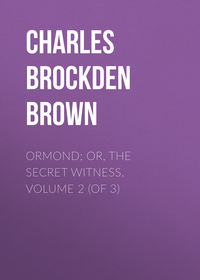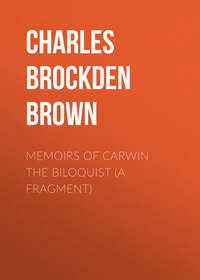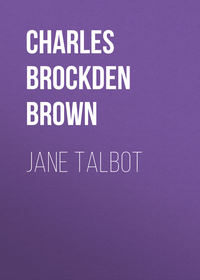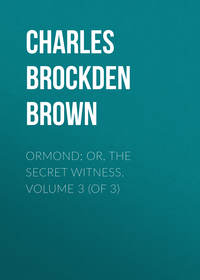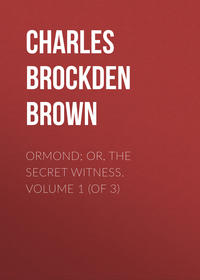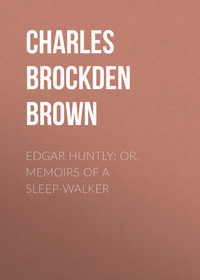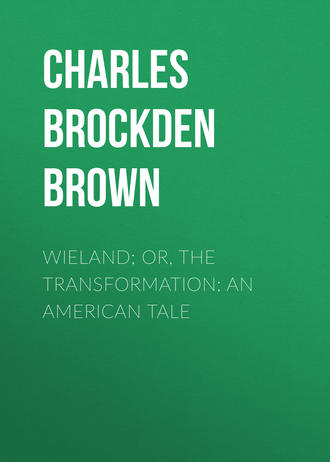 полная версия
полная версияWieland; Or, The Transformation: An American Tale
"And where are the proofs that must justify so foul and so improbable an accusation? You have overheard a midnight conference. Voices have saluted your ear, in which you imagine yourself to have recognized mine, and that of a detected villain. The sentiments expressed were not allowed to outweigh the casual or concerted resemblance of voice. Sentiments the reverse of all those whose influence my former life had attested, denoting a mind polluted by grovelling vices, and entering into compact with that of a thief and a murderer. The nature of these sentiments did not enable you to detect the cheat, did not suggest to you the possibility that my voice had been counterfeited by another.
"You were precipitate and prone to condemn. Instead of rushing on the impostors, and comparing the evidence of sight with that of hearing, you stood aloof, or you fled. My innocence would not now have stood in need of vindication, if this conduct had been pursued. That you did not pursue it, your present thoughts incontestibly prove. Yet this conduct might surely have been expected from Pleyel. That he would not hastily impute the blackest of crimes, that he would not couple my name with infamy, and cover me with ruin for inadequate or slight reasons, might reasonably have been expected." The sobs which convulsed my bosom would not suffer me to proceed.
Pleyel was for a moment affected. He looked at me with some expression of doubt; but this quickly gave place to a mournful solemnity. He fixed his eyes on the floor as in reverie, and spoke:
"Two hours hence I am gone. Shall I carry away with me the sorrow that is now my guest? or shall that sorrow be accumulated tenfold? What is she that is now before me? Shall every hour supply me with new proofs of a wickedness beyond example? Already I deem her the most abandoned and detestable of human creatures. Her coming and her tears imparted a gleam of hope, but that gleam has vanished."
He now fixed his eyes upon me, and every muscle in his face trembled. His tone was hollow and terrible—"Thou knowest that I was a witness of your interview, yet thou comest hither to upbraid me for injustice! Thou canst look me in the face and say that I am deceived!—An inscrutable providence has fashioned thee for some end. Thou wilt live, no doubt, to fulfil the purposes of thy maker, if he repent not of his workmanship, and send not his vengeance to exterminate thee, ere the measure of thy days be full. Surely nothing in the shape of man can vie with thee!
"But I thought I had stifled this fury. I am not constituted thy judge. My office is to pity and amend, and not to punish and revile. I deemed myself exempt from all tempestuous passions. I had almost persuaded myself to weep over thy fall; but I am frail as dust, and mutable as water; I am calm, I am compassionate only in thy absence.—Make this house, this room, thy abode as long as thou wilt, but forgive me if I prefer solitude for the short time during which I shall stay." Saying this, he motioned as if to leave the apartment.
The stormy passions of this man affected me by sympathy. I ceased to weep. I was motionless and speechless with agony. I sat with my hands clasped, mutely gazing after him as he withdrew. I desired to detain him, but was unable to make any effort for that purpose, till he had passed out of the room. I then uttered an involuntary and piercing cry—"Pleyel! Art thou gone? Gone forever?"
At this summons he hastily returned. He beheld me wild, pale, gasping for breath, and my head already sinking on my bosom. A painful dizziness seized me, and I fainted away.
When I recovered, I found myself stretched on a bed in the outer apartment, and Pleyel, with two female servants standing beside it. All the fury and scorn which the countenance of the former lately expressed, had now disappeared, and was succeeded by the most tender anxiety. As soon as he perceived that my senses were returned to me, he clasped his hands, and exclaimed, "God be thanked! you are once more alive. I had almost despaired of your recovery. I fear I have been precipitate and unjust. My senses must have been the victims of some inexplicable and momentary phrenzy. Forgive me, I beseech you, forgive my reproaches. I would purchase conviction of your purity, at the price of my existence here and hereafter."
He once more, in a tone of the most fervent tenderness, besought me to be composed, and then left me to the care of the women.
Chapter XIII
Here was wrought a surprizing change in my friend. What was it that had shaken conviction so firm? Had any thing occurred during my fit, adequate to produce so total an alteration? My attendants informed me that he had not left my apartment; that the unusual duration of my fit, and the failure, for a time, of all the means used for my recovery, had filled him with grief and dismay. Did he regard the effect which his reproaches had produced as a proof of my sincerity?
In this state of mind, I little regarded my languors of body. I rose and requested an interview with him before my departure, on which I was resolved, notwithstanding his earnest solicitation to spend the night at his house. He complied with my request. The tenderness which he had lately betrayed, had now disappeared, and he once more relapsed into a chilling solemnity.
I told him that I was preparing to return to my brother's; that I had come hither to vindicate my innocence from the foul aspersions which he had cast upon it. My pride had not taken refuge in silence or distance. I had not relied upon time, or the suggestion of his cooler thoughts, to confute his charges. Conscious as I was that I was perfectly guiltless, and entertaining some value for his good opinion, I could not prevail upon myself to believe that my efforts to make my innocence manifest, would be fruitless. Adverse appearances might be numerous and specious, but they were unquestionably false. I was willing to believe him sincere, that he made no charges which he himself did not believe; but these charges were destitute of truth. The grounds of his opinion were fallacious; and I desired an opportunity of detecting their fallacy. I entreated him to be explicit, and to give me a detail of what he had heard, and what he had seen.
At these words, my companion's countenance grew darker. He appeared to be struggling with his rage. He opened his lips to speak, but his accents died away ere they were formed. This conflict lasted for some minutes, but his fortitude was finally successful. He spoke as follows:
"I would fain put an end to this hateful scene: what I shall say, will be breath idly and unprofitably consumed. The clearest narrative will add nothing to your present knowledge. You are acquainted with the grounds of my opinion, and yet you avow yourself innocent: Why then should I rehearse these grounds? You are apprized of the character of Carwin: Why then should I enumerate the discoveries which I have made respecting him? Yet, since it is your request; since, considering the limitedness of human faculties, some error may possibly lurk in those appearances which I have witnessed, I will briefly relate what I know.
"Need I dwell upon the impressions which your conversation and deportment originally made upon me? We parted in childhood; but our intercourse, by letter, was copious and uninterrupted. How fondly did I anticipate a meeting with one whom her letters had previously taught me to consider as the first of women, and how fully realized were the expectations that I had formed!
"Here, said I, is a being, after whom sages may model their transcendent intelligence, and painters, their ideal beauty. Here is exemplified, that union between intellect and form, which has hitherto existed only in the conceptions of the poet. I have watched your eyes; my attention has hung upon your lips. I have questioned whether the enchantments of your voice were more conspicuous in the intricacies of melody, or the emphasis of rhetoric. I have marked the transitions of your discourse, the felicities of your expression, your refined argumentation, and glowing imagery; and been forced to acknowledge, that all delights were meagre and contemptible, compared with those connected with the audience and sight of you. I have contemplated your principles, and been astonished at the solidity of their foundation, and the perfection of their structure. I have traced you to your home. I have viewed you in relation to your servants, to your family, to your neighbours, and to the world. I have seen by what skilful arrangements you facilitate the performance of the most arduous and complicated duties; what daily accessions of strength your judicious discipline bestowed upon your memory; what correctness and abundance of knowledge was daily experienced by your unwearied application to books, and to writing. If she that possesses so much in the bloom of youth, will go on accumulating her stores, what, said I, is the picture she will display at a mature age?
"You know not the accuracy of my observation. I was desirous that others should profit by an example so rare. I therefore noted down, in writing, every particular of your conduct. I was anxious to benefit by an opportunity so seldom afforded us. I laboured not to omit the slightest shade, or the most petty line in your portrait. Here there was no other task incumbent on me but to copy; there was no need to exaggerate or overlook, in order to produce a more unexceptionable pattern. Here was a combination of harmonies and graces, incapable of diminution or accession without injury to its completeness.
"I found no end and no bounds to my task. No display of a scene like this could be chargeable with redundancy or superfluity. Even the colour of a shoe, the knot of a ribband, or your attitude in plucking a rose, were of moment to be recorded. Even the arrangements of your breakfast-table and your toilet have been amply displayed.
"I know that mankind are more easily enticed to virtue by example than by precept. I know that the absoluteness of a model, when supplied by invention, diminishes its salutary influence, since it is useless, we think, to strive after that which we know to be beyond our reach. But the picture which I drew was not a phantom; as a model, it was devoid of imperfection; and to aspire to that height which had been really attained, was by no means unreasonable. I had another and more interesting object in view. One existed who claimed all my tenderness. Here, in all its parts, was a model worthy of assiduous study, and indefatigable imitation. I called upon her, as she wished to secure and enhance my esteem, to mould her thoughts, her words, her countenance, her actions, by this pattern.
"The task was exuberant of pleasure, and I was deeply engaged in it, when an imp of mischief was let loose in the form of Carwin. I admired his powers and accomplishments. I did not wonder that they were admired by you. On the rectitude of your judgement, however, I relied to keep this admiration within discreet and scrupulous bounds. I assured myself, that the strangeness of his deportment, and the obscurity of his life, would teach you caution. Of all errors, my knowledge of your character informed me that this was least likely to befall you.
"You were powerfully affected by his first appearance; you were bewitched by his countenance and his tones; your description was ardent and pathetic: I listened to you with some emotions of surprize. The portrait you drew in his absence, and the intensity with which you mused upon it, were new and unexpected incidents. They bespoke a sensibility somewhat too vivid; but from which, while subjected to the guidance of an understanding like yours, there was nothing to dread.
"A more direct intercourse took place between you. I need not apologize for the solicitude which I entertained for your safety. He that gifted me with perception of excellence, compelled me to love it. In the midst of danger and pain, my contemplations have ever been cheered by your image. Every object in competition with you, was worthless and trivial. No price was too great by which your safety could be purchased. For that end, the sacrifice of ease, of health, and even of life, would cheerfully have been made by me. What wonder then, that I scrutinized the sentiments and deportment of this man with ceaseless vigilance; that I watched your words and your looks when he was present; and that I extracted cause for the deepest inquietudes, from every token which you gave of having put your happiness into this man's keeping?
"I was cautious in deciding. I recalled the various conversations in which the topics of love and marriage had been discussed. As a woman, young, beautiful, and independent, it behoved you to have fortified your mind with just principles on this subject. Your principles were eminently just. Had not their rectitude and their firmness been attested by your treatment of that specious seducer Dashwood? These principles, I was prone to believe, exempted you from danger in this new state of things. I was not the last to pay my homage to the unrivalled capacity, insinuation, and eloquence of this man. I have disguised, but could never stifle the conviction, that his eyes and voice had a witchcraft in them, which rendered him truly formidable: but I reflected on the ambiguous expression of his countenance—an ambiguity which you were the first to remark; on the cloud which obscured his character; and on the suspicious nature of that concealment which he studied; and concluded you to be safe. I denied the obvious construction to appearances. I referred your conduct to some principle which had not been hitherto disclosed, but which was reconcileable with those already known.
"I was not suffered to remain long in this suspence. One evening, you may recollect, I came to your house, where it was my purpose, as usual, to lodge, somewhat earlier than ordinary. I spied a light in your chamber as I approached from the outside, and on inquiring of Judith, was informed that you were writing. As your kinsman and friend, and fellow-lodger, I thought I had a right to be familiar. You were in your chamber, but your employment and the time were such as to make it no infraction of decorum to follow you thither. The spirit of mischievous gaiety possessed me. I proceeded on tiptoe. You did not perceive my entrance; and I advanced softly till I was able to overlook your shoulder.
"I had gone thus far in error, and had no power to recede. How cautiously should we guard against the first inroads of temptation! I knew that to pry into your papers was criminal; but I reflected that no sentiment of yours was of a nature which made it your interest to conceal it. You wrote much more than you permitted your friends to peruse. My curiosity was strong, and I had only to throw a glance upon the paper, to secure its gratification. I should never have deliberately committed an act like this. The slightest obstacle would have repelled me; but my eye glanced almost spontaneously upon the paper. I caught only parts of sentences; but my eyes comprehended more at a glance, because the characters were short-hand. I lighted on the words SUMMER-HOUSE, MIDNIGHT, and made out a passage which spoke of the propriety and of the effects to be expected from ANOTHER interview. All this passed in less than a moment. I then checked myself, and made myself known to you, by a tap upon your shoulder.
"I could pardon and account for some trifling alarm; but your trepidation and blushes were excessive. You hurried the paper out of sight, and seemed too anxious to discover whether I knew the contents to allow yourself to make any inquiries. I wondered at these appearances of consternation, but did not reason on them until I had retired. When alone, these incidents suggested themselves to my reflections anew.
"To what scene, or what interview, I asked, did you allude? Your disappearance on a former evening, my tracing you to the recess in the bank, your silence on my first and second call, your vague answers and invincible embarrassment, when you, at length, ascended the hill, I recollected with new surprize. Could this be the summerhouse alluded to? A certain timidity and consciousness had generally attended you, when this incident and this recess had been the subjects of conversation. Nay, I imagined that the last time that adventure was mentioned, which happened in the presence of Carwin, the countenance of the latter betrayed some emotion. Could the interview have been with him?
"This was an idea calculated to rouse every faculty to contemplation. An interview at that hour, in this darksome retreat, with a man of this mysterious but formidable character; a clandestine interview, and one which you afterwards endeavoured with so much solicitude to conceal! It was a fearful and portentous occurrence. I could not measure his power, or fathom his designs. Had he rifled from you the secret of your love, and reconciled you to concealment and noctural meetings? I scarcely ever spent a night of more inquietude.
"I knew not how to act. The ascertainment of this man's character and views seemed to be, in the first place, necessary. Had he openly preferred his suit to you, we should have been impowered to make direct inquiries; but since he had chosen this obscure path, it seemed reasonable to infer that his character was exceptionable. It, at least, subjected us to the necessity of resorting to other means of information. Yet the improbability that you should commit a deed of such rashness, made me reflect anew upon the insufficiency of those grounds on which my suspicions had been built, and almost to condemn myself for harbouring them.
"Though it was mere conjecture that the interview spoken of had taken place with Carwin, yet two ideas occurred to involve me in the most painful doubts. This man's reasonings might be so specious, and his artifices so profound, that, aided by the passion which you had conceived for him, he had finally succeeded; or his situation might be such as to justify the secrecy which you maintained. In neither case did my wildest reveries suggest to me, that your honor had been forfeited.
"I could not talk with you on this subject. If the imputation was false, its atrociousness would have justly drawn upon me your resentment, and I must have explained by what facts it had been suggested. If it were true, no benefit would follow from the mention of it. You had chosen to conceal it for some reasons, and whether these reasons were true or false, it was proper to discover and remove them in the first place. Finally, I acquiesced in the least painful supposition, trammelled as it was with perplexities, that Carwin was upright, and that, if the reasons of your silence were known, they would be found to be just."
Chapter XIV
"Three days have elapsed since this occurrence. I have been haunted by perpetual inquietude. To bring myself to regard Carwin without terror, and to acquiesce in the belief of your safety, was impossible. Yet to put an end to my doubts, seemed to be impracticable. If some light could be reflected on the actual situation of this man, a direct path would present itself. If he were, contrary to the tenor of his conversation, cunning and malignant, to apprize you of this, would be to place you in security. If he were merely unfortunate and innocent, most readily would I espouse his cause; and if his intentions were upright with regard to you, most eagerly would I sanctify your choice by my approbation.
"It would be vain to call upon Carwin for an avowal of his deeds. It was better to know nothing, than to be deceived by an artful tale. What he was unwilling to communicate, and this unwillingness had been repeatedly manifested, could never be extorted from him. Importunity might be appeased, or imposture effected by fallacious representations. To the rest of the world he was unknown. I had often made him the subject of discourse; but a glimpse of his figure in the street was the sum of their knowledge who knew most. None had ever seen him before, and received as new, the information which my intercourse with him in Valencia, and my present intercourse, enabled me to give.
"Wieland was your brother. If he had really made you the object of his courtship, was not a brother authorized to interfere and demand from him the confession of his views? Yet what were the grounds on which I had reared this supposition? Would they justify a measure like this? Surely not.
"In the course of my restless meditations, it occurred to me, at length, that my duty required me to speak to you, to confess the indecorum of which I had been guilty, and to state the reflections to which it had led me. I was prompted by no mean or selfish views. The heart within my breast was not more precious than your safety: most cheerfully would I have interposed my life between you and danger. Would you cherish resentment at my conduct? When acquainted with the motive which produced it, it would not only exempt me from censure, but entitle me to gratitude.
"Yesterday had been selected for the rehearsal of the newly-imported tragedy. I promised to be present. The state of my thoughts but little qualified me for a performer or auditor in such a scene; but I reflected that, after it was finished, I should return home with you, and should then enjoy an opportunity of discoursing with you fully on this topic. My resolution was not formed without a remnant of doubt, as to its propriety. When I left this house to perform the visit I had promised, my mind was full of apprehension and despondency. The dubiousness of the event of our conversation, fear that my interference was too late to secure your peace, and the uncertainty to which hope gave birth, whether I had not erred in believing you devoted to this man, or, at least, in imagining that he had obtained your consent to midnight conferences, distracted me with contradictory opinions, and repugnant emotions.
"I can assign no reason for calling at Mrs. Baynton's. I had seen her in the morning, and knew her to be well. The concerted hour had nearly arrived, and yet I turned up the street which leads to her house, and dismounted at her door. I entered the parlour and threw myself in a chair. I saw and inquired for no one. My whole frame was overpowered by dreary and comfortless sensations. One idea possessed me wholly; the inexpressible importance of unveiling the designs and character of Carwin, and the utter improbability that this ever would be effected. Some instinct induced me to lay my hand upon a newspaper. I had perused all the general intelligence it contained in the morning, and at the same spot. The act was rather mechanical than voluntary.
"I threw a languid glance at the first column that presented itself. The first words which I read, began with the offer of a reward of three hundred guineas for the apprehension of a convict under sentence of death, who had escaped from Newgate prison in Dublin. Good heaven! how every fibre of my frame tingled when I proceeded to read that the name of the criminal was Francis Carwin!
"The descriptions of his person and address were minute. His stature, hair, complexion, the extraordinary position and arrangement of his features, his aukward and disproportionate form, his gesture and gait, corresponded perfectly with those of our mysterious visitant. He had been found guilty in two indictments. One for the murder of the Lady Jane Conway, and the other for a robbery committed on the person of the honorable Mr. Ludloe.
"I repeatedly perused this passage. The ideas which flowed in upon my mind, affected me like an instant transition from death to life. The purpose dearest to my heart was thus effected, at a time and by means the least of all others within the scope of my foresight. But what purpose? Carwin was detected. Acts of the blackest and most sordid guilt had been committed by him. Here was evidence which imparted to my understanding the most luminous certainty. The name, visage, and deportment, were the same. Between the time of his escape, and his appearance among us, there was a sufficient agreement. Such was the man with whom I suspected you to maintain a clandestine correspondence. Should I not haste to snatch you from the talons of this vulture? Should I see you rushing to the verge of a dizzy precipice, and not stretch forth a hand to pull you back? I had no need to deliberate. I thrust the paper in my pocket, and resolved to obtain an immediate conference with you. For a time, no other image made its way to my understanding. At length, it occurred to me, that though the information I possessed was, in one sense, sufficient, yet if more could be obtained, more was desirable. This passage was copied from a British paper; part of it only, perhaps, was transcribed. The printer was in possession of the original.


